
Eisteddfod Genedlaethol Cymru
Tyddewi - 2002
Eisteddfod Update
Unfortunately I didn't get as far as the National Eisteddfod this year in St. David's, but, on checking out media coverage of the event a few things struck me which may be of interest in the context of my piece on last year's Eisteddfod in Denbigh. So here is a partial update.Location
This year it was the turn of South Wales to host the festival which was held in Pembrokeshire in St. David's, Tyddewi, the smallest city in Wales. Pembrokeshire is seen as rather anglicised but it is better described as linguistically partitioned. The chairman of the local executive committee, Councillor John Thomas, speaking in his presidential address on the closing Saturday, put it as follows:"Linguistically, the county is divided, English in the south, Welsh in the north. We know also that bridging the gap north and south has been a problem over the years - the Hwntws in the north and the Down Belows in the south, but we must admit that this Eisteddfod has succeeded in involving the county as a whole in promotional events and also in fund-raising activities."
Someone should tell that to Milford Haven's (South Pembrokeshire) Lord Mayor who last attended a National Eisteddfod in 1937 when he was a schoolboy and is quoted recently as saying "I'm afraid down here it does not count for much."
Attendance
Attendance this year totalled 127,000 compared with 143,000 last year and 162,000 at the record-breaking Llanelli festival in 2000. The fall in numbers is attributed both to the very bad weather towards the end of the week and the inaccessibility of the location.There was even a possibility of the site being evacuated during the week due to high winds, but they never reached the critical 55mph. Nevertheless they did wreak havoc on some of the stalls and on the adjacent camping site where 25 tents were blown away.
The festival has also been hit by traffic problems, including rail scheduling, leading to one American visitor claiming it took longer to travel from Swansea to St David's than to fly across the Atlantic.
Finances
There is some expectation of a modest loss on this year's festival. This would be the second loss in two years after the £33,000 loss at Denbigh last year.One man with a possible solution to this problem was Dr Aled Lloyd Davies, the retiring president of the National Eisteddfod Court and Council. He urged Eisteddfod supporters to support the festival through their wills and issued a particular challenge to all 2,200 members of the Eisteddfod Court .
Pavilion
Next year, the current pavilion, hired from a Dutch firm since 1988, will be replaced by a newer, stronger and better one. The new structure will meet health and safety regulations more easily and save on spending needed every year to bring the existing pavilion within requirements. This has been a major reason why the cost of the Eisteddfod now exceeds £2m each year .Lights .. action !
 A festival director always has to be ready for the unexpected.
A festival director always has to be ready for the unexpected. Last year saw a major campaign in favour of ethical sponsorship. This year it was the presence of a cigarette stall which caused consternation, particularly given its location - next door to a van selling sweets to children. And this on a field where smoking is banned even in the Press area, of all places.
The booze ban also came under some pressure as Welsh author Arwel Jones offered a bottle of lager with every copy of his book at the Lolfa stand. Organiser Aled Sin said: "We do have a no alcohol rule and this is conveyed in the package given to every stallholder. ....The rule is quite clear, stating that there should not be any alcohol on any stand, be it given away or sold, and we have visited the Lolfa stand to spell out the rule, for what they have done is clearly in contravention of such rule."
Nevertheless, the Eisteddfod had agreed in advance to Tesco displaying alcohol products on the basis that they were not actually being sold.
Cunning stunt
There did not appear to be any difficulty with some other exhibits, however: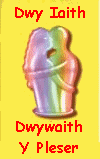 Permission was given for the first time for the sale of bilingual condoms at the festival. The move - part of a safe sex message on the Maes - is being marketed with the bilingual slogan: Dwy Iaith. Dwy Waith y Pleser (Two Languages. Twice the Pleasure). The Cardiff-based company who came up with the idea got the full support of the Eisteddfod organisers. Eisteddfod marketing officer Betsan Williams said the permission was granted to promote safe sex during Eisteddfod week.
Permission was given for the first time for the sale of bilingual condoms at the festival. The move - part of a safe sex message on the Maes - is being marketed with the bilingual slogan: Dwy Iaith. Dwy Waith y Pleser (Two Languages. Twice the Pleasure). The Cardiff-based company who came up with the idea got the full support of the Eisteddfod organisers. Eisteddfod marketing officer Betsan Williams said the permission was granted to promote safe sex during Eisteddfod week. Two young women, aged 19 and 23, who did not wish to be named, gave their support to the bilingual product. "This is a fantastic idea and an excellent means of marketing something that is very much part of the life of so many people, particularly the younger generation, as far as the visit to the Eisteddfod is concerned."
Now, how did I miss that ?
A tick in time
The "Coffin of Shame" which disappeared after it was carried around Wales has been found. The coffin was paraded by Cymru Annibynnol (Independent Wales Party) in protest over the Welsh tick box, missing from last year's census. The six -foot coffin was put on display at the Eisteddfod along with the Book of Shame, signed by Census Refuseniks.Poetry
Both the chair and crown this year were won by men, both of whom used humorous pen-names.The crown bard chose Alber Bored Venison as a variant on Alfred Lord Tennyson, while the chair bard went for Pawb yn y Pafiliwn, meaning Everyone in the Pavilion, conjuring up the vision of the Archdruid asking if “Everyone in the Pavilion” was present, and would “Everyone in the Pavilion” please stand up – in order to identify the winner! Nice one.
The crown
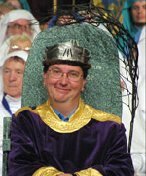 The media "angle" this year was on the fact that the crown bard was a recovered alcoholic. Aled John Williams, by his own admission, would not have taken up writing had it not been for his experiences with alcohol, followed by his leaving the church in which he had been ordained a minister, and then joining the Arche Community in Liverpool.
The media "angle" this year was on the fact that the crown bard was a recovered alcoholic. Aled John Williams, by his own admission, would not have taken up writing had it not been for his experiences with alcohol, followed by his leaving the church in which he had been ordained a minister, and then joining the Arche Community in Liverpool.The crown's creator, leading Welsh sculptor, David Peterson, designed it with St. David in mind which is why he used neither precious metals or stones.This is the first time cast iron has been used in the making of a bardic crown. The design shows the outline of Carn Llidi and the Pembrokeshire hills.
The chair
 The set subject for the chair was Llwybrau, pathways, and Myrddin ap Dafydd's winning entry was a series of stanzas evoking connections between places, people, communities and their histories and mythologies.The adjudicator praised the author's uncommon skill in using old metres to celebrate his theme.
The set subject for the chair was Llwybrau, pathways, and Myrddin ap Dafydd's winning entry was a series of stanzas evoking connections between places, people, communities and their histories and mythologies.The adjudicator praised the author's uncommon skill in using old metres to celebrate his theme. The winner had already written and published one stanza before the subject was even set. This had to be excluded from the entered work but will be included in subsequent publications.
He has already won a number of honours, including the Urdd National Eisteddfod chair in 1974, the National Eisteddfod chair at Cwm Rhymni in 1990, the Tír-na-nÓg Prize in 2001 and the Féile Filíochta Prize, Dún Laoghaire 2001.
Prose
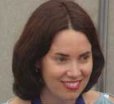 Angharad Price took the prose medal for her fictional autobiography O! Tyn y Gorchudd (Oh! Pull the Cover), based on the imagined experience of her great aunt. The winning work tells the story of Rebecca Jones, whose life appears to span the 20th Century. But we learn that Rebecca died aged 11 and the story is an imagined life of what might have been.
Angharad Price took the prose medal for her fictional autobiography O! Tyn y Gorchudd (Oh! Pull the Cover), based on the imagined experience of her great aunt. The winning work tells the story of Rebecca Jones, whose life appears to span the 20th Century. But we learn that Rebecca died aged 11 and the story is an imagined life of what might have been. Adjudicator Hywel Teifi Edwards said there were strengths in all 21 entries, but O! Tyn y Gorchudd had cast its spell over him. He said, "It makes us feel the passion of her relationship to her environment, and what causes the writing at its best to move one to tears is the sparkling intensity with which she relates the things that have enlivened her life..... It's not a life without sorrow, but running through it is an enduring love for her people and her area. There is a fear about the maintainence of the Welsh society reflected in the story of Rebecca Jones, and the message and essence of the piece is in her unfailing loyalty to that which she loves."
Adjudicator Hywel Teifi Edwards said there were strengths in all 21 entries, but O! Tyn y Gorchudd had cast its spell over him. He said, "It makes us feel the passion of her relationship to her environment, and what causes the writing at its best to move one to tears is the sparkling intensity with which she relates the things that have enlivened her life..... It's not a life without sorrow, but running through it is an enduring love for her people and her area. There is a fear about the maintainence of the Welsh society reflected in the story of Rebecca Jones, and the message and essence of the piece is in her unfailing loyalty to that which she loves."
Significantly, Angharad is an addition to the list of potential female candidates for Archdruid in the future. The Archdruid is elected by the Gorsedd from among winners of the Crown, Chair and latterly the Prose Medal. The present Archdruid is a prose medallist and the first such to be elected Archdruid on that basis.
An electronic version of Angharad's book was launched at the Eisteddfod in the presence of Assembly Minister for Culture, Sport and the Welsh Language, Jenny Randerson. This has been developed by the Royal National Institute for the Blind which is keen to use modern technology to improve provision of reading material - in both Welsh and English - for the blind and partially-sighted.
Scholarship witheld
Interestingly, this year, the Emyr Feddyg Scolarship, a lighter prose competition, which was won last year by the entry entitled "Horny Girl", was witheld this year. This reinforces what I said last year - if entries are not up to the required standard then the prize, even be it the crown or chair, is witheld. Other prizes witheld included the music medal, political soliloquy, talk between two, children's novel, and the gold medal for art and design.Pagan Archbishop Elect
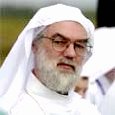 One of the more amusing aspects of this year's Eisteddfod concerned the present Archbishop of Wales, and Archbishop Elect of Canterbury, joining the white order of the Gorsedd of Bards. He was portrayed in the London tabloids, whose knowledge of Wales rarely extends beyond the West End, as joining a pagan sect. They might, however, have some grounds for mitigation in this case as even some fellow churchmen felt obliged to protest at the impression he was making with those of his future flock not familiar with Wales and her ways.
One of the more amusing aspects of this year's Eisteddfod concerned the present Archbishop of Wales, and Archbishop Elect of Canterbury, joining the white order of the Gorsedd of Bards. He was portrayed in the London tabloids, whose knowledge of Wales rarely extends beyond the West End, as joining a pagan sect. They might, however, have some grounds for mitigation in this case as even some fellow churchmen felt obliged to protest at the impression he was making with those of his future flock not familiar with Wales and her ways.
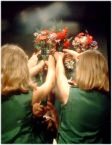
Three priests, who toured the Eisteddfod maes calling on eisteddfodwyr to reject the paganism of druidism, met with a largely hostile reception.
One of these, Rev Andrew Price, said, "However much the excuse is made that the Gorsedd is merely an expression of Welsh cultural identity, it cannot disguise the fact that the symbolism of the language and dress is pagan rather than Christian".
 He pointed to an official Eisteddfod leaflet which stresses the central significance of the sun - a pagan symbol - to the Gorsedd. He said the Gorsedd ceremonies - which include dances based on the fruitfulness of the earth - were "rooted in pagan ritual".
He pointed to an official Eisteddfod leaflet which stresses the central significance of the sun - a pagan symbol - to the Gorsedd. He said the Gorsedd ceremonies - which include dances based on the fruitfulness of the earth - were "rooted in pagan ritual".With what must surely rank as a supreme irony The (London) Times even drafted in its religion correspondent to cover the ceremony. The Gorsedd, is after all, simply a pageant which adds a bit of ceremony to the literary competitions and serves as a Welsh-Wales honours list.
It is also redolent with Christian prayers and allusions. At the end of the day, however, it is the pagans who would have problems with its monotheism.
Eisteddfod Virgins get It
The Western Mail showed it had a genuine sense of humour by running a piece entitled "Confessions of an Eisteddfod Virgin" who, it turned out wasn't quite a virgin, but her friend was. No matter, the point is that while even Eisteddfod virgins get it, the English press just don't.She quotes the experience of a former Eisteddfod press officer who once spent an hour trying to explain the poetic discipline of cynghanedd and the significance of the crowning and chairing ceremonies to a Guardian journalist. He didn't get it.
She rightly remarks that if a festival that celebrated poetic excellence with such pageantry was held in a remote Latvian village, the Guardian would probably devote a colour supplement to it. And if Scotland had a National Eisteddfod, every arts journalist in London would head north each summer.
English writers would kill for the attention lavished on Eisteddfod winners. Who wants a drunken black-tie do and a lump of engraved crystal when you can be swathed in purple velvet, crowned and enthroned?
Internet
Major progress was reported this year in the dynamic side of the Eisteddfod's own website. The site was only introduced last year. This year's broadcast had an added element of user choice. As well as the major ceremonies, competitions at the festival were broadcast live on the internet, with anyone around the world able to pick and choose which camera they want to view, and at what time."We're playing everything from the pavilion, and because we use the same feed as the BBC we can change cameras, so it's not just a normal webcam," said Peter Davies the Eisteddfod's finance secretary.
Last year more than 177,000 people visited the Eisteddfod's site. BBC Cymru'r Byd's site, which also carries Eisteddfod coverage, has around 160,000 page impressions a week. Grahame Davies, executive director of Cymru'r Byd, said the service had expanded rapidly since it was launched in 2000.
A joint venture by BBC Wales and the National Eisteddfod will provide a permanent gallery for the Eisteddfod's winning arts and crafts entries. The English language site, and the Welsh equivalent, was launched at this year's festival after months of cooperation between the BBC Wales online team and the Eisteddfod.
The pages include a comprehensive list of all winners in the arts and crafts section, images of all the winning entries in art, crafts and architecture, and adjudicators' comments on the individual pieces.
Dead links club
While the dynamic element of the Eisteddfod site may have improved this year, the static text pages were a disappointment.There was a complete absence of current news updates on the festival. Copius material was retained from last year which could easily be taken by the casual visitor as referring to this year's festival. The website was an important innovation and it should be an authoritive source for those who could not attend the event itself but wanted to keep in touch with developments (like me). The text-based element was a worthwhile source of competition results and official press releases and plans should be put in hand to develop it in the coming years.
Meanwhile, the BBCand the Western Mail (in Welsh and in English respectively) offer the non-attender a limited textual flavour of this year's events.
Another plug-in
In another worthwhile experiment, the Wales Digital College brought internet access to anyone who turned up with a computer at the Welsh Language Board tent at the Eisteddfod .They erected a huge mast at the St David's site so that anyone with a computer could access the internet via satellite without the need for a connection. Euryn Owen, from the Wales Digital College, said, "Satellite means you can send 11Mb per second, it's very, very quick. But we need to learn from what we've seen in the United States, which is that broadband can help keep young people in their areas".
The technology is still being developed. But the team is confident it can be made to work, particularly with the Assembly's recent pledge to subsidise satellite broadband for rural businesses.
At present, there is no satellite "hub" or exchange in Britain, with the Eisteddfod using a centre in Paris to control the technology.
Irish Connexions
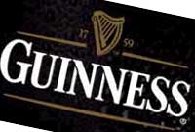 An interesting development this year was a series of lectures, in the Societies' Tent on the Eisteddfod field, on connections between Ireland and Wales. The series ran under the title Dwylo dros y Môr (Hands across the Sea) and was organised by a society, the Famine Forum of Wales (Cymdeithas Fforwm Cymru y Newyn), which was set up to facilitate relations between Ireland and Wales.
An interesting development this year was a series of lectures, in the Societies' Tent on the Eisteddfod field, on connections between Ireland and Wales. The series ran under the title Dwylo dros y Môr (Hands across the Sea) and was organised by a society, the Famine Forum of Wales (Cymdeithas Fforwm Cymru y Newyn), which was set up to facilitate relations between Ireland and Wales.The subjects looked interesting, ranging from contemporary developments in language planning in the celtic countries to an examination of how Ireland and Wales saw each other as expressed through Irish and Welsh language literature. The range of speakers and chairs was no less impressive, including university lecturers from both sides of the water, a member of the Welsh Assembly, an Irish diplomat and ministers of more than one religion from both celtic countries. Among the clerics were Tad Fitzgerald, whom I mentioned in my report of last year's Eisteddfod, and Pádraig Ó Fíannachta, whose work for the Irish language goes back aeons and who is a fluent Welsh speaker. The series was launched by Jim Carroll, Principal Consul of Ireland in Wales, who spoke in Irish with simultaneous interpretation into Welsh.
Niamh Chinn Óir
Theatr na n'Og launched the 2002 version of Nia Ben Aur (Niamh Chinn Óir) at the Eisteddfod this year. It will be toured throughout Wales early next year. This rock opera was initially staged by members of Welsh rock bands at the 1974 National Eisteddfod at Carmarthen where it was a stunning success.Language Politics
An expanded version of this section is here. Language politics were back on the Eisteddfod agenda again this year, starting at the end of June with the investiture of the new Archdruid who, in a hard hitting speech, immediately called for radical language rights. [1]
Language politics were back on the Eisteddfod agenda again this year, starting at the end of June with the investiture of the new Archdruid who, in a hard hitting speech, immediately called for radical language rights. [1]He reminded the Gorsedd of its fundamental role in safeguarding and promoting the Welsh language and of the need for it to speak out clearly and fearlessly when necessary.
"It was only by compulsion that they succeeded in decimating the Welsh language; it is only by compulsion that we shall restore it", he said.
Assembly member Delyth Evans, by contrast, pointed out that a new Welsh Language Act , as sought by language activists, could jeopardise future investment in Wales. " Attracting companies to areas where there have been job losses, such as Cardigan, would be more difficult if the companies were forced to conduct all their business in Welsh."
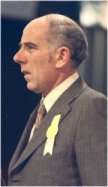 Later in the week Jâms Nicholas, the Gorsedd Recorder and the only living Pembrokeshire "prifardd" (chair/crown poet), delivered another impassioned speech, this time from the Eisteddfod stage. "I'm old enough to recall the cutting down of the hedges, and roads and homes and farms disappearing forever," he said.
Later in the week Jâms Nicholas, the Gorsedd Recorder and the only living Pembrokeshire "prifardd" (chair/crown poet), delivered another impassioned speech, this time from the Eisteddfod stage. "I'm old enough to recall the cutting down of the hedges, and roads and homes and farms disappearing forever," he said. "It is a shocking experience for me when I return home to realise that part of our Welsh civilisation has been destroyed
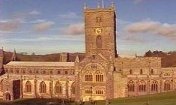 here within half a century and it sobers me to realise that this could easily happen throughout Wales within 100 years.....
The fact that the Eisteddfod has raised its pavilion on this headland is a call to the whole of Wales to do everything within its ability to defend its language and its communities."
here within half a century and it sobers me to realise that this could easily happen throughout Wales within 100 years.....
The fact that the Eisteddfod has raised its pavilion on this headland is a call to the whole of Wales to do everything within its ability to defend its language and its communities."The Heartlands
 Clive Betts, who wrote the seminal book on the Heartlands (Welsh Gaeltachtaí) in 1976 [2], recalled that last year's festival at Denbigh saw the consensus of the past 15 years break down when a former Welsh Language Board chairman, made a strong attack on the effects on the Welsh language of immigration by non-Welsh-speakers into its heartland.
Clive Betts, who wrote the seminal book on the Heartlands (Welsh Gaeltachtaí) in 1976 [2], recalled that last year's festival at Denbigh saw the consensus of the past 15 years break down when a former Welsh Language Board chairman, made a strong attack on the effects on the Welsh language of immigration by non-Welsh-speakers into its heartland.
The Board's own annual report this year is more guarded:
 "Unfortunately, what some of our fellow Welshmen and women have been saying and doing of late - often for quite sincere reasons - has put the prevailing consensus in peril. We cannot succeed in our work without the success of the majority. We must treat everyone, whatever their opinions, with respect and tolerance."
"Unfortunately, what some of our fellow Welshmen and women have been saying and doing of late - often for quite sincere reasons - has put the prevailing consensus in peril. We cannot succeed in our work without the success of the majority. We must treat everyone, whatever their opinions, with respect and tolerance."

A spokesman for Cymuned, a newly formed movement which claims to speak for the heartlands' communities, said, "The basic issue is demographic change and the movement by the strongest language group in the world, on a very large scale, into the area of a minority language and the report does not deal with this".
Plaid Cymru vice-president, Dafydd Iwan, speaking at a Cymdeithas Yr Iaith Gymraeg (Welsh Language Society) rally on the field, accused the Government of misunderstanding the housing problem.
 "We must bring pressure to bear on the National Assembly government to ensure that the law is changed to prevent the sale of any more council houses in order to ensure that those who were unable to afford to buy houses were still able to rent. "Young families are having to compete against people with plenty of money and it is about time the National Assembly moved forward to give local families priority. For anyone to say that this is racist, that's rubbish," he said.
"We must bring pressure to bear on the National Assembly government to ensure that the law is changed to prevent the sale of any more council houses in order to ensure that those who were unable to afford to buy houses were still able to rent. "Young families are having to compete against people with plenty of money and it is about time the National Assembly moved forward to give local families priority. For anyone to say that this is racist, that's rubbish," he said.
 The Assembly Government, however, is making a major effort to win support for its own moderate agenda Dyfodol Dwyieithog : Bilingual Future.
The Assembly Government, however, is making a major effort to win support for its own moderate agenda Dyfodol Dwyieithog : Bilingual Future.During a visit to the Eisteddfod, Jenny Randerson, Assembly Minister for Culture, Sport and the Welsh Language, took issue with claims that the report is attaching blame to individuals or people who move into parts of Wales.
 "This is categorically not the case," she said. "It is a fact that the decline of the use of the language is due to a number of factors. The Assembly Government has taken into account all of these factors in creating a new policy aimed at revitalising the Welsh Language. "Our intention is to sustain and encourage the growth of the Welsh language within a tolerant, welcoming and open Wales."
"This is categorically not the case," she said. "It is a fact that the decline of the use of the language is due to a number of factors. The Assembly Government has taken into account all of these factors in creating a new policy aimed at revitalising the Welsh Language. "Our intention is to sustain and encourage the growth of the Welsh language within a tolerant, welcoming and open Wales."Clive Betts also reported that the results of last year's census, which is to be published at the end of this year, are expected to show that the number speaking Welsh will remain static, but that the percentages speaking the language in its heartland communities will have fallen seriously.
 Language and community issues also arose in the context of the competitions. An example was the entry which won the Fine Art Gold Medal for painter and art historian Dr Ivor Davies, of Penarth. His work, which was a powerful plea against Wales being involved in other countries' wars, also highlighted the destruction of the Welsh language and Welsh communities.
Language and community issues also arose in the context of the competitions. An example was the entry which won the Fine Art Gold Medal for painter and art historian Dr Ivor Davies, of Penarth. His work, which was a powerful plea against Wales being involved in other countries' wars, also highlighted the destruction of the Welsh language and Welsh communities.
Dr Davies will be taking the unusual step of handing the £3,000 prize money back to the Eisteddfod to support other artists over the next five years.
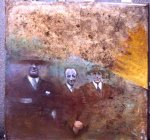 "It is my wish that the money be used to provide a prize for a painter, sculptor or other whose work in the Eisteddfod's arts and crafts section carries the spirit of activism in the struggle for Welsh culture, language or politics," he said.
"It is my wish that the money be used to provide a prize for a painter, sculptor or other whose work in the Eisteddfod's arts and crafts section carries the spirit of activism in the struggle for Welsh culture, language or politics," he said. According to the art and crafts selectors, it was Dr Davies's three element piece, 'Yr Ysgrifen ar y Mur: Dinistr Iaith a Chymuned (The Writing on the Wall: Destruction of Language and Community), which provided the abiding image which stayed with them throughout the entire selection process.
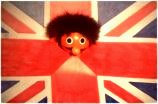
Radical heads
This is a more radical Eisteddfod compared with that at neighbouring Haverfordwest in 1972, which I attended, and where some of the non-Welsh speaking organising committee claimed the event was politically biased by failing to fly the union flag from the main pavilion. Today, even the word "royal" [3] in the official title of the festival is soft-pedalled in deference to the nationalist ethos.People
Ned Thomas is still working away. He got a grant last year to research the possibility of producing a daily Welsh language newspaper. He sees the absence of a daily as the major gap in Welsh communications at present. Welsh speakers currently rely on a weekly, Y Cymro, and on occasional columns in Welsh in the local English language press for "national" coverage of Welsh affairs. Ned had 15 months and £60,000 to come up with an answer. Funding came from Europe, the Welsh Development Authority and a rake of other smaller sources.
Ned had 15 months and £60,000 to come up with an answer. Funding came from Europe, the Welsh Development Authority and a rake of other smaller sources. He is convinced that such a venture would be possible but refuses to anticipate the results of his research, due in the autumn. He cites a number of minority language dailies in Europe, some of which cater for smaller numbers than a potential Welsh readership and some are subsidised by central and regional Governments. He feels any solution will involve some groupings and it will also have to take account of possible technological developments, such as those on the internet.
Some of the media are getting a little impatient with Ned's ongoing research. Gwylim Owen, from the BBC, reports that, when Ned's mobile went off during a techno-digital lecture at the Eisteddfod and Ned eventually rushed for the door, some of the audience were speculating that the call was from Rupert Murdoch asking when he might get sight of the new daily.
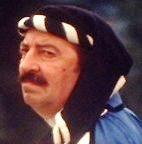 Dillwyn Miles turned up to give a talk on his reminiscences of the Gorsedd over the years. He has already written a history of the Gorsedd and put some of his more personal memories to paper.
Dillwyn Miles turned up to give a talk on his reminiscences of the Gorsedd over the years. He has already written a history of the Gorsedd and put some of his more personal memories to paper. He was reportedly not entranced with the attitude of the audience to the "royal" aspects of the festival and the Gorsedd.
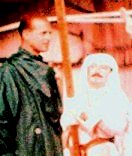 Dillwyn was onstage in 1960 to welcome the Duke of Edinburgh to the green order of the Gorsedd.
Dillwyn was onstage in 1960 to welcome the Duke of Edinburgh to the green order of the Gorsedd. In fact many of the British royal family became members, including the Queen Mother (1925) [4], the Duke (1960) and the present Queen (1946) [5]. Even Queen Marie of Romania was admitted as an honorary member [6]. Dillwyn is informally credited with ensuring maintenance of the "royal" epithet prominently in the festival's title up to the time he retired.
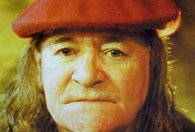 Meic Stevens seems to have had an unfortunate experience at this year's Eisteddfod, to say the least. Having made it to a concert in the Pafiliwn itself, no small thing, he appears to have disappointed at least one reviewer (for the BBC website). She berates the sound system, the backing instrumentalists, and the attendance, some of whom talked through the performance.
Meic Stevens seems to have had an unfortunate experience at this year's Eisteddfod, to say the least. Having made it to a concert in the Pafiliwn itself, no small thing, he appears to have disappointed at least one reviewer (for the BBC website). She berates the sound system, the backing instrumentalists, and the attendance, some of whom talked through the performance. She accuses Meic of forgetting whole lines of his own songs and relying on Heather Jones, with her very special voice, to keep things more or less together. Mind you, she admits that the formality of the vast pavilion was not exactly Meic's scene and that he adjusted in the second part of the show. She was hopeful that his next gig would be in more conducive surroundings including "a pubfull of wine, smoke (?) and bad girls !"
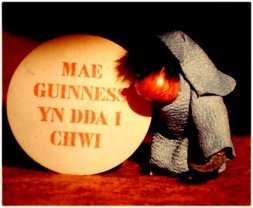
Back to Polo's home page.
Footnotes
[1] A quick update on the current state of the Welsh language is available here and further background can be found at the Welsh Language Board's website.[2] And to whom I am indebted for some of the material included (nicked) in this report.
[3] The royal prefix had to be applied for on an annual basis up to 1965 when it was awarded on a permanent basis by Queen Elizabeth II.
[4] Under the bardic name "Betsi o Efrog"
[5] Despite reports to the contrary, the Princess, as she then was, opened the 1946 Eisteddfod with some words of Welsh, after having been received into the Gorsedd as "Elisabeth o Windsor". The Times's religion correspondent, Ruth Gledhill, "reminds" us that the Gorsedd is confined to Welsh speakers and that the Queen is the only non-Welsh-speaking member.
I'm sure the Queen mother and the Duke of Edinburgh, who were initiated into the Gorsedd, would have been interested to learn they were classed as Welsh speakers ! In fact, according to the rules, the following categories are excepted from the Welsh-speaking rule: (i) member of the Royal Family (ii) head of a foreign state (iii) a distinguished author, musician or artist of any other nation whom Wales desires to honour.
Perhaps The Times should have had its Royal Correspondent cover the occasion.
[6] Under the title "Mair Gwalia" in 1925.